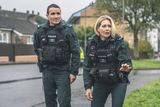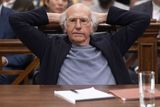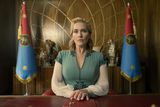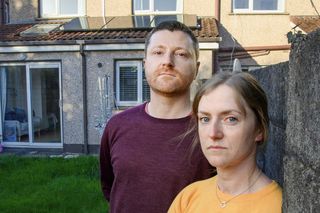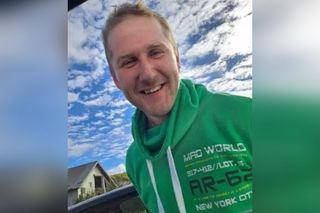One of three things can happen in BBC's 'The Missing'
Television
One of three things can happen in The Missing, BBC1's new eight-part drama about the disappearance of five-year-old English boy Oliver during a family holiday in northern France - he might turn up alive, we might learn that he's been killed or we might never discover his fate.
If the last turns out to be the case, we'll be in Amber territory and, like many viewers of that four-part RTÉ drama, I'll be muttering obscenities and throwing the remote control at the TV screen. Let's hope it won't be so.
The disappearance here occurs at a crowded open-air bar as locals are watching the 2006 World Cup match between France and Brazil, and the mounting panic that seizes Olly's dad Tony as he searches for his son is brilliantly achieved, not least through the playing of James Nesbitt as realisation of the boy's vanishing finally registers with him.
He's even more affectingly raw when, eight years later, he's still searching for Olly in the same locality - his relationship with his wife having by now broken down as he obsessively, almost dementedly, persists with his self-imposed mission.
Madeleine McCann's disappearance has been mentioned by some commentators in relation to this series (foreign setting, nice English couple, young child), but I was more reminded of George Sluizer's film The Vanishing - not the misguided 1993 Hollywood remake (also directed by Sluizer and starring Jeff Bridges and Keifer Sutherland), but the deeply disturbing 1988 original which offered no consolations to the viewer in its account of a man's obsessive pursuit of the truth about his wife's disappearance from a roadside service station.
And Nesbitt, who has coasted on his easy charm in too many roles, conveyed much of the same self-devouring torment in The Missing's opening episode, with fine playing also from Frances O'Connor as his wife and from Turkish actor Tcheky Karyo as the French detective who has unofficially come out of retirement to assist Nesbitt in his dogged quest for the truth.
However, it remains to be seen if the storyline will sustain our attention for seven more instalments.
I'll certainly be watching it next week, which is more than I can say about Intruders on BBC2 or Resurrection on RTÉ2, both of them billed as supernatural thrillers but neither of them remotely spooky. The opening episode of Intruders had faint echoes of The X Files and louder ones of Invasion of the Body Snatchers as sinister black-garbed men sought to achieve immortality by inhabiting the bodies of children. Or so the programme notes informed me, though from what I was watching on the screen I hadn't the foggiest what was happening.
After a nocturnal visit from a man in black, a young girl cut her wrists in the bath (or at least I think she did), while another young girl in another house drowned her cat.
Meanwhile, the man in black entered yet another house and gunned down a mother and her teenage son. So how was that achieving immortality?
Maybe detective Jack, who's played by English actor John Simm, will discover the truth. Or maybe Simm will spend the entire series struggling to master a convincing American accent. Either way, I won't be watching.
Nor will I be wasting my eyeballs or brain cells on Resurrection, which rehashes the plot of last year's creepy French series, Les Revenants (The Returned), in which a succession of people, long presumed dead, arrived back in their Alpine town as if nothing had happened.
That went badly off the rails towards the end, but Resurrection's first episode wasn't on any rails at all, whether in terms of suspense or atmosphere. Yet another dud RTÉ2 import.
Meanwhile, The Insiders (RTÉ1) followed last week's slavishly admiring puff for the GAA with a similarly uncritical paean to the genius of Riverdance creators Moya Doherty, Bill Whelan, Michael Flatley and Jean Butler. The voiceover informed us that Doherty wanted to fill the 1994 Eurovision interval slot with something that was "urban, edgy, innovative - a new image of Ireland", Doherty herself confessing: "I just hated all that Celtic nonsense."
Some might argue that what she came up was merely another kind of Celtic nonsense, but such arguments were absent from a film whose sole mission was to assure us of the greatness of these visionaries. Doherty, though, should learn that a crescendo is not a climax ("I wanted something that would build to an enormous crescendo"), and the caption writer should have been told that Jean Butler was not the "principle female dancer", though I've no doubt she's also a principled person.
Happily, there were better documentaries to be watched, not least Cogar: The Year of the Big Snow (TG4). The footage was in grainy black-and-white, but that was because it concerned the seven weeks in early 1947 when Ireland was so blanketed in snow that hardly anything or anyone moved.
Those under the age of 70-something only know of this from parents or grandparents, but the film featured a quirky selection of people who recalled it vividly.
Dubliner Brian Mac Aonghusa remembered fuel shortages and unscrupulous shopkeepers who drenched turf in water so that the sods would be heavier and thus cost more. Nicolas Ó Griofain from Ring talked of churches being cut off, "and you had to go to Mass in those days or everyone would be talking about you". The film was crammed with such historical and social titbits.
I liked, too, the Storyville documentary, 112 Weddings (BBC4), in which American photographer Doug Block returned to some of the people whose wedding ceremonies he'd been hired to video.
Augie confessed that after eight years of marriage to Jenn they're sometimes "at each other's throats", and recently divorced Steve said of his 19-year marriage to Sue that he "hadn't been happy in years".
There were more optimistic stories, too, and Block handled them all with grace and tact.
Join the Irish Independent WhatsApp channel
Stay up to date with all the latest news

